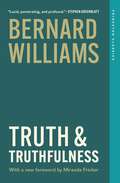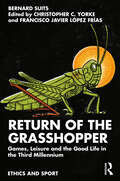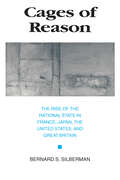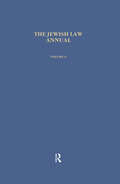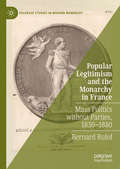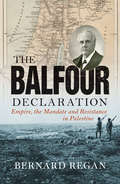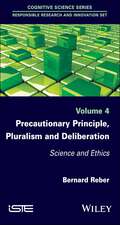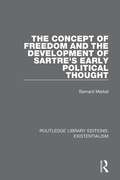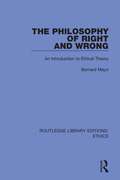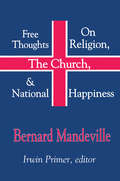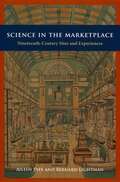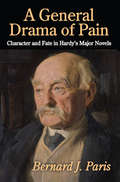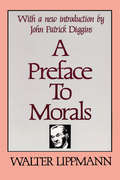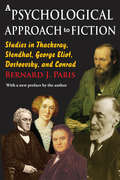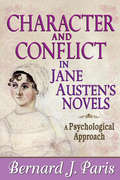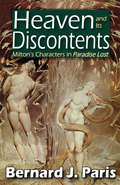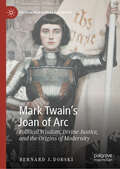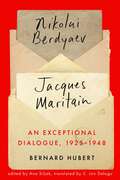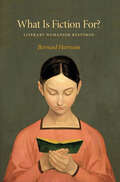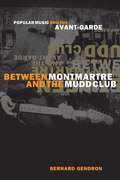- Table View
- List View
Truth and Truthfulness: An Essay in Genealogy (Princeton Classics)
by Bernard WilliamsWhat does it mean to be truthful? What role does truth play in our lives? What do we lose if we reject truthfulness? No philosopher is better suited to answer these questions than Bernard Williams. Writing with his characteristic combination of passion and elegant simplicity, he explores the value of truth and finds it to be both less and more than we might imagine.Modern culture exhibits two attitudes toward truth: suspicion of being deceived (no one wants to be fooled) and skepticism that objective truth exists at all (no one wants to be naive). This tension between a demand for truthfulness and the doubt that there is any truth to be found is not an abstract paradox. It has political consequences and signals a danger that our intellectual activities, particularly in the humanities, may tear themselves to pieces.Williams's approach, in the tradition of Nietzsche's genealogy, blends philosophy, history, and a fictional account of how the human concern with truth might have arisen. Without denying that we should worry about the contingency of much that we take for granted, he defends truth as an intellectual objective and a cultural value. He identifies two basic virtues of truth, Accuracy and Sincerity, the first of which aims at finding out the truth and the second at telling it. He describes different psychological and social forms that these virtues have taken and asks what ideas can make best sense of them today.Truth and Truthfulness presents a powerful challenge to the fashionable belief that truth has no value, but equally to the traditional faith that its value guarantees itself. Bernard Williams shows us that when we lose a sense of the value of truth, we lose a lot both politically and personally, and may well lose everything.
Return of the Grasshopper: Games, Leisure and the Good Life in the Third Millennium (Ethics and Sport)
by Bernard SuitsIn this sequel to Bernard Suits’ timeless classic philosophical work The Grasshopper: Games, Life and Utopia, published in its full and unabridged form for the first time, Suits continues to explore some of our most fundamental philosophical questions, including the value of sport and games, and their relationship to the good life. In Return of the Grasshopper, Suits puts his theoretical cards on the table, exploring the in-depth implications of his definition of utopia, assessing the merits of a gamified philosophy, and explaining how games can provide an existential balm against the fear of death. Perhaps most importantly, for the first time in print, Suits reveals his underlying worldview: that humanity is forever fated to endure a cyclical existence of privation, brought on by material scarcity, and boredom, resulting from material plenitude. An essential companion to The Grasshopper, this edition includes an introductory chapter that puts Suits’ life and work into context, helping the reader to understand why Suits has had such a profound influence on contemporary philosophy and how his ideas still provide powerful insight into the human condition. This book is important reading for anybody with an interest in the philosophy of sport, leisure and play, political philosophy, ethics, existentialism or utopian studies.
Cages Of Reason: The Rise Of The Rational State In France, Japan, The United States, And Great Britain
by Bernard S. SilbermanBlending political, historical, and sociological analysis, Bernard S. Silberman offers a provocative explanation for the bureaucratic development of the modern state. The study of modern state bureaucracy has its origins in Max Weber's analysis of the modes of social domination, which Silberman takes as his starting point. Whereas Weber contends that the administration of all modern nation-states would eventually converge in one form characterized by rationality and legal authority, Silberman argues that the process of bureaucratic rationalization took, in fact, two courses. One path is characterized by permeable organizational boundaries and the allocation of information by "professionals." The other features well-defined boundaries and the allocation of information by organizational rules. Through case studies of France, Japan, the United States, and Great Britain, Silberman demonstrates that this divergence stems from differences in leadership structure and in levels of uncertainty about leadership succession in the nineteenth century. Silberman concludes that the rise of bureacratic rationality was primarily a response to political problems rather than social and economic concerns. Cages of Reason demonstrates how rationalization can have occurred over a wide range of cultures at various levels of economic development. It will be of considerable interest to readers in a number of disciplines: political science, sociology, history, and public administration. "Silberman has produced an invaluable, densely packed work that those with deep knowledge of public administrative development will find extremely rewarding." —David H. Rosenbloom, American Political Science Review "An erudite, incisive, and vibrant book, the product of intensive study and careful reflection. Given its innovative theoretical framework and the wealth of historical materials contained in it, this study will generate debate and stimulate research in sociology, political science, and organizational theory. It is undoubtedly the best book on the comparative evolution of the modern state published in the last decade."—Mauro F. Guillen, Contemporary Sociology
Jewish Law Annual (Jewish Law Annual #10)
by Bernard S JacksonFirst Published in 1992. This collection of papers is Volume ten from The Jewish Law Institute. Split onto three parts, it covers the area of Parent and Child, including amongst others, offences punishable by death, child custody, Parents and Children under Moslem Law, Physical Violence and Herod’s Domestic Court. . Part two entitled Chronicle, has examples of cases and Part three includes a survey of recent literature.
Popular Legitimism and the Monarchy in France: Mass Politics without Parties, 1830–1880 (Palgrave Studies in Modern Monarchy)
by Bernard RulofThis book explores mid-nineteenth-century French legitimism and the implications of popular support for a movement that has traditionally been portrayed as an aristocratic force intent on restoring the Old Regime. This type of monarchism has often been understood as a form of elitist patronage politics or, alternatively, identified with ultramontane Catholicism. Although historians have offered a more nuanced view in the last few decades, their work, nevertheless, has predominantly focused on legitimist leaders rather than their followers and their professed feelings of loyalty to monarchy and monarch. This book’s originality therefore is twofold: firstly as an analysis of popular rather than élite monarchism; and secondly, as a study which portrays this form of royalism as a political movement characteristic of a period which saw the emergence of mass politics, while parties were still non-existent. It not only discusses the social and cultural settings of (popular) monarchism, but also contributes to the history of political parties, citizenship and democracy.
The Affirmation of Life: Nietzsche on Overcoming Nihilism
by Bernard ReginsterAmong all the great thinkers of the past two hundred years, Nietzsche continues to occupy a special place--not only for a broad range of academics but also for members of a wider public, who find some of their most pressing existential concerns addressed in his works. Central among these concerns is the question of the meaning of a life characterized by inescapable suffering, at a time when the traditional responses inspired by Christianity are increasingly losing their credibility. While most recent studies of Nietzsche's works have lost sight of this fundamental issue, Bernard Reginster's book The Affirmation of Life brings it sharply into focus. Reginster identifies overcoming nihilism as a central objective of Nietzsche's philosophical project, and shows how this concern systematically animates all of his main ideas. In particular, Reginster's work develops an original and elegant interpretation of the will to power, which convincingly explains how Nietzsche uses this doctrine to mount a critique of the dominant Christian values, to overcome the nihilistic despair they produce, and to determine the conditions of a new affirmation of life. Thus, Reginster attributes to Nietzsche a compelling substantive ethical outlook based on the notions of challenge and creativity--an outlook that involves a radical reevaluation of the role and significance of suffering in human existence. Replete with deeply original insights on many familiar--and frequently misunderstood--Nietzschean concepts, Reginster's book will be essential to anyone approaching this towering figure of Western intellectual history.
The Balfour Declaration: Empire, the Mandate and Resistance in Palestine
by Bernard ReganThe true history of the imperial deal that transformed the Middle East and sealed the fate of PalestineOn November 2, 1917, the British government, represented by Foreign Minister Arthur Balfour, declared that they were in favor of “the establishment in Palestine of a national home for the Jewish people.” This short note would be one of the most controversial documents of its time.A hundred years after its signing, Bernard Regan recasts the history of the Balfour Declaration as one of the major events in the story of the Middle East. Offering new insights into the imperial rivalries between Britain, Germany and the Ottomans, Regan exposes British policy in the region as part of a larger geopolitical game. Yet, even then, the course of events was not straightforward and Regan charts the debates within the British government and the Zionist movement itself on the future of Palestine.The book also provides a revealing account of life in Palestinian society at the time, paying particular attention to the responses of Palestinian civil society to the imperial machinations that threatened their way of life. Not just a history of states and policies, Regan manages to brilliantly present both a history of people under colonialism and an account of the colonizers themselves.
Precautionary Principle, Pluralism and Deliberation: Science and Ethics
by Bernard ReberThis volume tackles the burden of judgment and the challenges of ethical disagreements, organizes the cohabitation of scientific and ethical argumentations in such a way they find their appropriate place in the political decision. It imagines several forms of agreements and open ways of conflicts resolution very different compared with ones of the majority of political philosophers and political scientists that are macro-social and general. It offers an original contribution to a scrutinized interpretation of the precautionary principle, as structuring the decision in interdisciplinary contexts, to make sure to arrive this time to the "Best of the Worlds".
The Concept of Freedom and the Development of Sartre's Early Political Thought (Routledge Library Editions: Existentialism #2)
by Bernard MerkelThis book, first published in 1987, is a study of the development of Sartre’s political thought from the late 1920s to the liberation of France in 1944, concentrating particularly upon his concept of freedom. It is argued that the evolution of Sartre’s thinking can be regarded as constituting a series of problematics each of which has a corresponding notion of freedom, and these problematics are elucidated in turn.
The Philosophy of Right and Wrong
by Bernard MayoTrying to understand morality involves grappling with seemingly irreconcilable conflicts between opposing theoretical positions. Originally published in 1986, this book offers a solution in terms of natural law, which involves reflections on the relevant aspects of human nature and the human condition, as well as on the special nature of prescriptive language. It also discusses several major movements in moral philosophy, both classical and contemporary and examines them in the light of a set of tests for an adequate moral theory.
The principles of representative government
by Bernard ManinThe thesis of this original and provocative book is that representative government should be understood as a combination of democratic and undemocratic elements. Challenging the conventionally held views on the subject, Professor Manin reminds us that while today representative institutions and democracy appear as virtually indistinguishable, when representative government was first established in Europe and America, it was designed in opposition to democracy proper. The author identifies the essential features of democratic institutions and reviews the history of their application.
Free Thoughts on Religion, the Church, and National Happiness: By B. M (Scholars' Facsimiles And Reprints Ser.)
by Bernard MandevilleBernard Mandeville was best known for The Fable of the Bees, in which he demolishes the supposed moral basis of society by a Hobbesian demonstration that civilization depends on vice. Today Mandeville is seen as a trenchant satirist of the manners and foibles of his age. He is also seen as a precursor of some of Adam Smith's doctrines, a forerunner in the field of sociology. A prescient analyst of the dynamics of our modern consumer society, Mandeville is author of a striking naturalistic account of the gradual evolution of modern society from its primitive antecedents. His literary signature, in a manner of speaking, is his famous paradox, "private vices, public benefits." This new edition of Free Thoughts is prefaced by a lengthy and informative introduction by Irwin Primer, who recreates not only the literary, political, and religious atmosphere surrounding Mandeville, but also the controversies that surrounded his writing in mid-eighteenth-century England. Primer includes textual notes on the first and second editions of this classic work. To understand Mandeville's Free Thoughts, one needs to situate it within the context of the religious and political controversies, ongoing subversion, fear and dormant warfare of his times. Those would eventually erupt again and for the last time in the bloody Jacobite rebellion of 1745-46. The first five chapters of the book explore religious and theological issues including the nature of belief and knowledge, the significance of rites and ceremonies, and controversies about Christian mysteries such as the Trinity and free will and predestination. The next five chapters explore controversial issues of church politics, including persecution and toleration across the centuries, the basis of Mandeville's anticlericalism. In the eleventh chapter, he turns aside from matters of religion to review the balance of powers in Britain's government, a mixed or limited monarchy. The final chapter is essentially a repetition of Mandeville's pleas for civil and religious peace through mutual toleration by opposing religious parties. Mandeville's work is of continuing interest to students of culture and history, religion and theology, and political science. Irwin Primer is professor emeritus at Rutgers University who has written widely on Mandeville and the Scottish tradition in philosophy.
Method in Theology
by Bernard LonerganMethod in Theology stands, with Insight, as Bernard Lonergan's most important work. It is Lonergan's answer to those who would argue that in this time of cultural change and dissolution the believer is afloat on a sea of multiplying theologies, without rudder or compass. Lonergan was resolute in his refusal to be defeatist on this point. While agreeing that theology must continually change to mediate between religion and culture, he worked out an integral method to guide and control this ongoing process.This is a reprint of the 1973 edition. A new annotated edition of Method in Theology will be published eventually as a part of the Collected Works of Bernard Lonergan.Bernard Lonergan (1904-1984), a professor of theology, taught at Regis College, Harvard University, and Boston College. An established author known for his Insight and Method in Theology, Lonergan received numerous honorary doctorates, was a Companion of the Order of Canada in 1971 and was named as an original members of the International Theological Commission by Pope Paul VI.
Science in the Marketplace: Nineteenth-Century Sites and Experiences
by Bernard Lightman Aileen FyfeThe nineteenth century was an age of transformation in science, when scientists were rewarded for their startling new discoveries with increased social status and authority. But it was also a time when ordinary people from across the social spectrum were given the opportunity to participate in science, for education, entertainment, or both. In Victorian Britain science could be encountered in myriad forms and in countless locations: in panoramic shows, exhibitions, and galleries; in city museums and country houses; in popular lectures; and even in domestic conversations that revolved around the latest books and periodicals. Science in the Marketplace reveals this other side of Victorian scientific life by placing the sciences in the wider cultural marketplace, ultimately showing that the creation of new sites and audiences was just as crucial to the growing public interest in science as were the scientists themselves. By focusing attention on the scientific audience, as opposed to the scientific community or self-styled popularizers, Science in the Marketplace ably links larger societal changes—in literacy, in industrial technologies, and in leisure—to the evolution of “popular science. ”
The Right, the Good and the Happy: The Christian in a World of Distorted Values
by Bernard L. Ramm[from inside flaps] "Why have drugs replaced beer, cigarettes, and even hamburgers in the life of the young person? What should be done about the large number of living dead--human vegetables who are kept alive through machines? Is it right to postpone the inevitable? Why should any woman in the twentieth century want or need an abortion? Should there never be abortion? Should there be abortion on request? Does the implantation of an organ from the body of one person to another create a crisis of identity in the person who has the transplant? * When is a person actually dead? * Who should receive the transplant--an unknown or a prominent community personality? Does the individual have the right to decide if a war is just or not and have his decision honored by the government? Can atomic war ever be considered a just war? In the technological age a man may live two hundred years. If there is work enough to last him only to age thirty, what is he supposed to do for the next 170 years? All of these situations demand ethical decisions. Should the Christian's choice, in any of these matters, be more realistic or more compassionate than that of any other person? Dr. Bernard L. Ramm points out that if Christianity is a total way of life--and he believes that this is what the Bible teaches--then the ethical and moral character of the Christian's life must reflect the love, justice, and equity of God whom he worships. The Right, the Good and the Happy is a practical book. After dealing briefly with general ethical theory, the author concentrates on specific moral and ethical issues. But this is not a guide to easy ethical decisionmaking. Dr. Ramm presents arguments for and against a given position. Occasionally he takes sides; often he lets the reader draw his own conclusions. Traditionally, there has been a strong emphasis in the church that if a person has accepted Christ, he will almost always make right choices. But an automatic change of heart in human relations or politics or economics does not necessarily occur just because a person is converted. What should the church's message be as it seeks to lead and train Christians toward a mature ethical perspective? Dr. Ramm says that there can be only one approach if the followers of Christ are to be enriched through growth into the right, the good, and the happy life. "The church ought to follow ethical policies that are redemptive, that are healing, and that offer hope for happiness in the future.""
A General Drama of Pain: Character and Fate in Hardy's Major Novels
by Bernard J. ParisThis motivational analysis of the protagonists in Thomas Hardy's three most widely read novels--Tess of the d'Urbervilles, The Mayor of Casterbridge, and Jude the Obscure--highlights an often-overlooked aspect of his art. Bernard J. Paris shows Hardy's genius in creating imagined human beings. He demonstrates that while Hardy tends to blame external conditions for his characters' painful fates, their downfalls are due to a very complex combination of cosmic, social, and psychological factors. Hardy's characters are usually discussed primarily in thematic terms. The characters are are so richly portrayed, Paris argues, that they can be better understood independent of Hardy's interpretations, in motivational terms and he utilizes the psychologist Karen Horney's theories to recover Hardy's intuitions. The characters are full of inner conflicts that make them difficult to fathom, but the approach Paris employs explains their contradictions and illuminates their troubled relationships--shedding light on these expertly crafted imagined human beings. This psychological approach to Hardy's characters enables us to understand his characters and gain insight into the implied authors of the works. In addition, the approach shows Hardy's authorial personality. We can see that Hardy treats some defensive strategies more sympathetically than others. Given his view of life as a general drama of pain, resignation, like that of Hardy's character Elizabeth-Jane, is the strategy he prefers.
A Preface to Morals
by Bernard J. ParisAfter an eloquent and moving analysis of what he sees as the disillusion of themodern age, Lippmann posits as the central dilemma of liberalism its inability to find an appropriate substitute for the older forms of authority-- church, state, class, family, law, custom--that it has denied. Lippmann attempts to find a way out of this chaos through the acceptance of a higher humanism and a way of life inspired by the ideal of -disinterestedness- in all things. In his new introduction to the Transaction edition, John Patrick Diggins marks A Preface to Morals, originally published in 1929, as a critical turning point in Lippmann's intellectual career. He also provides an excellent discussion of the enduring value of this major twentieth-century work by situating it within the context of other intellectual movements.
A Psychological Approach to Fiction: Studies in Thackeray, Stendhal, George Eliot, Dostoevsky, and Conrad
by Bernard J. Paris"Psychology helps us to talk about what the novelist knows, but fiction helps us to know what the psychologist is talking about." So writes the author of this brilliant study. The chief impulse of realistic fiction is mimetic; novels of psychological realism call by their very nature for psychological analysis. This study uses psychology to analyze important characters and to explore the consciousness of the author and the work as a whole. What is needed for the interpretation of realistic fiction is a psychological theory congruent with the experience portrayed. Emerging from Paris' approach are wholly new and illuminating interpretations of Becky Sharp, William Dobbin, Amelia Sedley, Julien Sorel, Madame de Renal, Mathilde de la Mole, Maggie Tulliver, the underground man, Charley Marlow, and Lord Jim. The psychological approach employed by Paris helps the reader not only to grasp the intricacies of mimetic characterization, but also to make sense of thematic inconsistencies which occur in some of the books under consideration. For students of human behavior as well as students of literature, the great figures of realistic fiction provide a rich source of empathic understanding and psychological insight.
Character and Conflict in Jane Austen's Novels: A Psychological Approach
by Bernard J. ParisIn Character and Conflict in Jane Austen's Novels , Bernard J. Paris offers an analysis of the protagonists in four of Jane Austen's most popular novels. His analysis reveals them to be brilliant mimetic creations who often break free of the formal and thematic limitations placed upon them by Austen. Paris traces the powerful tensions between form, theme, and mimesis in Mansfield Park , Emma , Pride and Prejudice , and Persuasion . Paris uses Northrop Frye's theory of comic forms to analyse and describe the formal structure of the novels, and Karen Horney's psychological theories to explore the personalities and inner conflicts of the main characters. The concluding chapter turns from the characters to their creator, employing the Horneyan categories of self-effacing, detached, and expansive personality types to interpret Jane Austen's own personality. Readers of Jane Austen will find much that is new and challenging in this study. It is one of the few books to recognise and pay tribute to Jane Austen's genius in characterisation. Anyone who reads this book will come away with a new understanding of Austen's heroines as imagined human beings and also with a deeper feeling for the troubled humanity of the author herself.
Heaven and Its Discontents: Milton's Characters in Paradise Lost
by Bernard J. ParisMany critics agree with C. S. Lewis that "Satan is the best drawn of Milton's characters". Satan is certainly a wonderful creation, but Adam and Eve are also complex and well-drawn, and God may be the most complicated character of all. Paradise Lost is above all God's story; it is his discontent, first with Lucifer and then with human beings, that drives the action from the beginning until his anger subsides at the world's end. God and Satan have similarities not only in their pursuit of revenge, but also in their craving for power and glory. The ambitious Satan wants more than he already has, but what accounts for the voracity of God's appetite? Does the fact that each threatens the status of the other help to explain the intensity of their hatred and rage? Is their vindictiveness a response to being threatened, an effort to repair the injury they feel they've sustained? This seems to be the case for Satan, but must not God also have felt deeply hurt to have such a powerful need for vengeance? If so, why is the Almighty so vulnerable? And why is he so hard on Adam and Eve and the rest of humankind? These are the kinds of questions Bernard Paris tries to answer in this book. Paris's purpose is not to focus on Milton's illustrative intentions but to try to understand God, Satan, Adam, and Eve as psychologically motivated characters who are torn by inner conflicts.Most critics treat Milton's characters as coded messages from the author, but their mimetic features interfere with the process of decoding. Instead of looking through the characters to the author, Paris looks at Milton's characters as objects of interest in themselves, as creations inside a creation who escape their thematic roles and are embodiments of his psychological intuitions. This book heightens our appreciation of an ignored aspect of Milton's art and offers new insights into the critical controversies that have surrounded Paradise Lost.
Mark Twain’s Joan of Arc: Political Wisdom, Divine Justice, and the Origins of Modernity (Recovering Political Philosophy)
by Bernard J. DobskiThis book is about the political wisdom embodied in Personal Recollections of Joan of Arc by Mark Twain, the self-declared best book by arguably America’s greatest author. More precisely, this study illuminates Twain’s political wisdom by examining his approach to the theological-political problem; it takes up Twain’s handling of the question of whether a providential deity intervenes in human affairs so as to effectuate divine justice on earth and it does this through a commentary on his last complete novel. Through this investigation, Twain prompts his audience to explore the natural, conventional, or divine basis for justice in political life. Such a study is critical for understanding Twain’s corpus, concerned as it is with the tension between material determinism and moral agency. Dobski argues that Twain’s last novel prepares his readers to adopt a “new” understanding of man and his relationship to God, his country, and his fellow man.
An Exceptional Dialogue, 1925–1948: Nikolai Berdyaev and Jacques Maritain
by Bernard HubertIn 1924 the Russian Orthodox philosopher in exile Nikolai Berdyaev ended up in the environs of Paris, where he met and befriended the French Catholic philosopher Jacques Maritain. Coming from different faiths and disparate cultures, they shared a common desire to assert the essential dignity and rights of the human person in an era torn apart by extremism and conflict. They embarked on a joint endeavour to promote ecumenical dialogue and philosophical conversation in interwar Europe. Their collaboration was instrumental in developing a philosophy of Christian personalism and seminal in the emergence of existentialism.Newly translated into English, An Exceptional Dialogue, 1925–1948 reproduces the two thinkers’ correspondence, along with Bernard Hubert’s original introductory essay, his notes to the French edition, and a new introduction by Ana Siljak. An intimate and remarkable portrait emerges. The two men met and corresponded often during their two decades of friendship, their homes became spaces for conversations on religion and philosophy, and together they contributed to the development of a Christian humanism and personalism that inspired such disparate figures as Hannah Arendt and Martin Luther King Jr and that influenced Maritain’s work on the United Nations Universal Declaration of Human Rights.An Exceptional Dialogue, 1925–1948 reveals the connectedness between Russian and European thought, explores the contributions of French-Russian personalism to the history of human dignity, and provides insight into a strain of philosophy often ignored in contemporary scholarship.
What Is Fiction For?: Literary Humanism Restored
by Bernard HarrisonHow can literature, which consists of nothing more than the description of imaginary events and situations, offer any insight into the workings of "human reality" or "the human condition"? Can mere words illuminate something that we call "reality"? Bernard Harrison answers these questions in this profoundly original work that seeks to re-enfranchise reality in the realms of art and discourse. In an ambitious account of the relationship between literature and cognition, he seeks to show how literary fiction, by deploying words against a background of imagined circumstances, allows us to focus on the roots, in social practice, of the meanings by which we represent our world and ourselves. Engaging with philosophers and theorists as diverse as Wittgenstein, Sartre, Merleau-Ponty, Foucault, Derrida, F. R. Leavis, Cleanth Brooks, and Stanley Fish, and illustrating his ideas through readings of works by Swift, Woolf, Appelfeld, and Dickens, among others, this book presents a systematic defense of humanism in literary studies, and of the study of the Humanities more generally, by a distinguished scholar.
Between Montmartre and the Mudd Club: Popular Music and the Avant-Garde
by Bernard GendronDuring the late nineteenth and early twentieth century, popular music was considered nothing but vulgar entertainment. Today, jazz and rock music are seen as forms of art, and their practitioners are regularly accorded a status on par with the cultural and political elite. To take just one recent example, Bono, lead singer and lyricist of the rock band U2, got equal and sometimes higher billing than Pope John Paul II on their shared efforts in the Jubilee 2000 debt-relief project. When and how did popular music earn so much cultural capital? To find out, Bernard Gendron investigates five key historical moments when popular music and avant-garde art transgressed the rigid boundaries separating high and low culture to form friendly alliances. He begins at the end of the nineteenth century in Paris's Montmartre district, where cabarets showcased popular music alongside poetry readings in spaces decorated with modernist art works. Two decades later, Parisian poets and musicians "slumming" in jazz clubs assimilated jazz's aesthetics in their performances and compositions. In the bebop revolution in mid-1940s America, jazz returned the compliment by absorbing modernist devices and postures, in effect transforming itself into an avant-garde art form. Mid-1960s rock music, under the leadership of the Beatles, went from being reviled as vulgar music to being acclaimed as a cutting-edge art form. Finally, Gendron takes us to the Mudd Club in the late 1970s, where New York punk and new wave rockers were setting the aesthetic agenda for a new generation of artists. Between Montmartre and the Mudd Club should be on the shelves of anyone interested in the intersections between high and low culture, art and music, or history and aesthetics.
Between Montmartre and the Mudd Club: Popular Music and the Avant-Garde
by Bernard GendronDuring the late nineteenth and early twentieth century, popular music was considered nothing but vulgar entertainment. Today, jazz and rock music are seen as forms of art, and their practitioners are regularly accorded a status on par with the cultural and political elite. To take just one recent example, Bono, lead singer and lyricist of the rock band U2, got equal and sometimes higher billing than Pope John Paul II on their shared efforts in the Jubilee 2000 debt-relief project. When and how did popular music earn so much cultural capital? To find out, Bernard Gendron investigates five key historical moments when popular music and avant-garde art transgressed the rigid boundaries separating high and low culture to form friendly alliances. He begins at the end of the nineteenth century in Paris's Montmartre district, where cabarets showcased popular music alongside poetry readings in spaces decorated with modernist art works. Two decades later, Parisian poets and musicians "slumming" in jazz clubs assimilated jazz's aesthetics in their performances and compositions. In the bebop revolution in mid-1940s America, jazz returned the compliment by absorbing modernist devices and postures, in effect transforming itself into an avant-garde art form. Mid-1960s rock music, under the leadership of the Beatles, went from being reviled as vulgar music to being acclaimed as a cutting-edge art form. Finally, Gendron takes us to the Mudd Club in the late 1970s, where New York punk and new wave rockers were setting the aesthetic agenda for a new generation of artists.Between Montmartre and the Mudd Club should be on the shelves of anyone interested in the intersections between high and low culture, art and music, or history and aesthetics.
